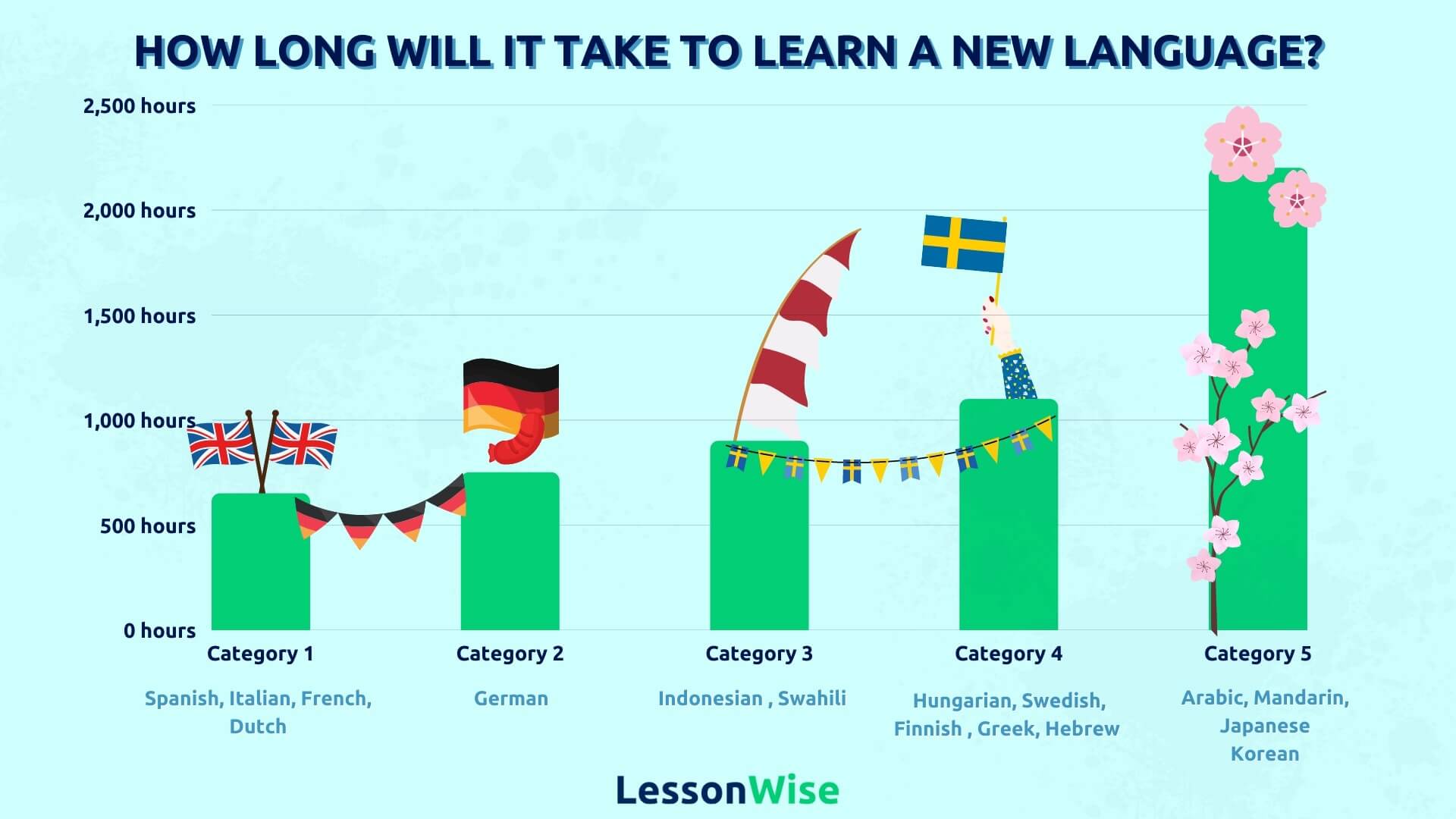How long will it take you to learn a new language
Learning a new language is a difficult and lengthy process, but how long does it actually take?
- What language you are learning
- Time spent learning each day
- What method of learning you are using
- How dedicated a learner you are
Generally, it can take anywhere from 3 months to 2 years to learn to speak, write and read a new language fluently. But we can narrow this down further.
You can use multiple tools to gauge how long it'll take you to learn a new language.
FSI 5 Categories

These are five categories of languages based on the difficulty and study time required for a native English speaker to learn them. Categorized by the Foreign Service Institute. Assuming that you are a casual learner and spend 3 hours a day learning each of these languages, how long would it take?
Category 1 are languages very closely related to English such as Italian, Dutch or Spanish. It would take you about 7 months to get general professional proficiency.
Category 2 are languages similar to English, like German. It would take 9 months to gain the same level of proficiency.
Category 3 languages such as Swahili or Indonesian have a higher level of complexity. It would take 10 months to gain proficiency.
Category 4 languages have fundamental cultural and linguistics differences from English, these include most European languages. It would take a year to gain proficiency in these languages.
Category 5 languages share little to nothing with English, from pronunciation to alphabet such as Arabic, Chinese and Korean. It would take just over 2 years to gain proficiency in one of these languages!
Expectations
You also need to set a goal for your learning. Do you want to be able to fluently chat in Italian or want a career in Germany?
Every language learner has a unique journey to their own goals. We recommend using the CEFR (Common European Framework of Reference) for Languages to gauge what your goals are.

Motivation and Mindset
When learning a new language, you might find it hard to be consistent in your learning process, and might find it boring at times or even frustrating.
Like with any learning goal, you will face roadblocks in your journey and as such it's important that you embrace the struggle and keep moving forward! Stick to the plan and keep learning - you will overcome all obstacles by simply being consistent!
Try as much as possible to remove any distractions when you are practising or going through your coursework. This would help stick to your schedule and prevent you from wasting time unnecessarily.
It's also important to find out what works for you when it comes to learning. Some people can only learn from books, others need audiovisual content, whilst some require private tutoring to keep on track.
It is astonishing how much enjoyment one can get out of a language that one understands imperfectly.
Methods of Learning
Everyone learns differently and there are a dozen different ways to learn a new language.
- Youtube videos - Youtube videos can be an amazing method to revise content, learn pronunciation and get used to the cultural aspects of the language.
- Books - Some people can learn grammar and vocabulary using language books or school textbooks.
- Language Lessons - Signing up for a language course and learning with others in person.
- Online Group Tutoring - Online tutoring is a highly effective and convenient way to learn a new language. It also has the added benefit that students get to ask questions to an expert tutor whilst connecting with other like-minded students and sharing their learning journey.

If you are a very dedicated learner who wishes to realize your potential as soon as possible you can also try using cognitive learning strategies. Different strategies will work for different people so consider giving them all a shot.
Conclusion
You can learn any language with a slow but steady approach of learning it yourself using all the free resources on the internet and in your local library. Use youtube videos, textbooks and free apps to get to grips with the language and figure out how you learn along the way.
Alternatively, you can use professional help in the form of live online group tutoring to work together with others and accelerate your language learning.